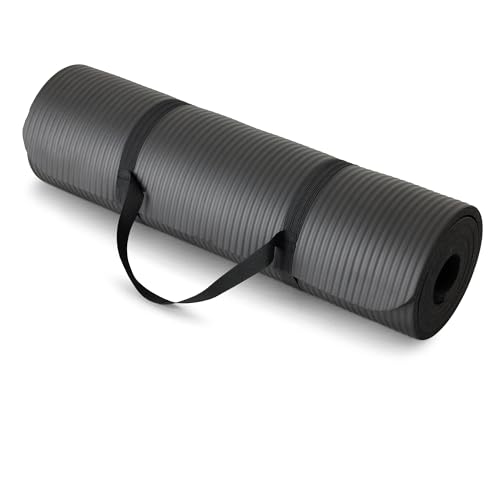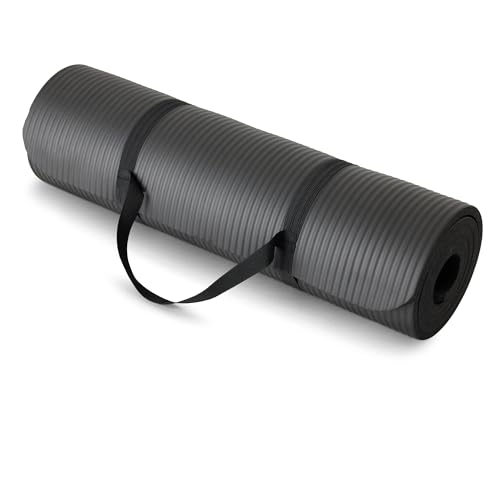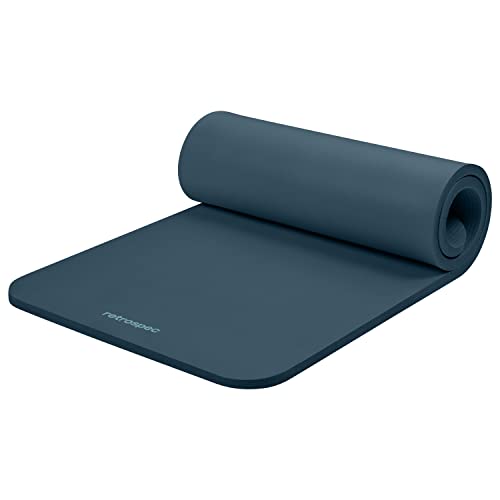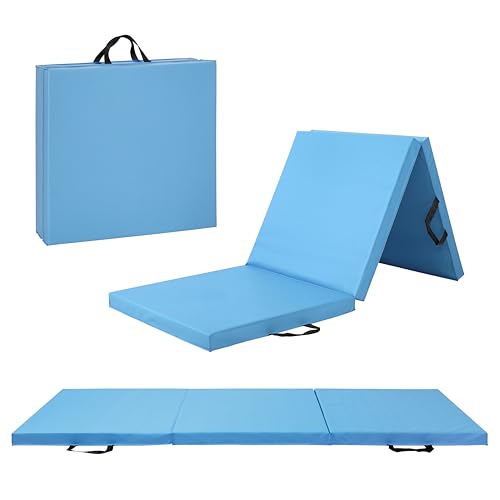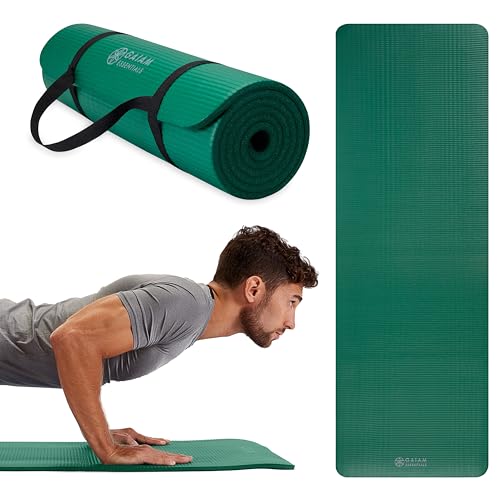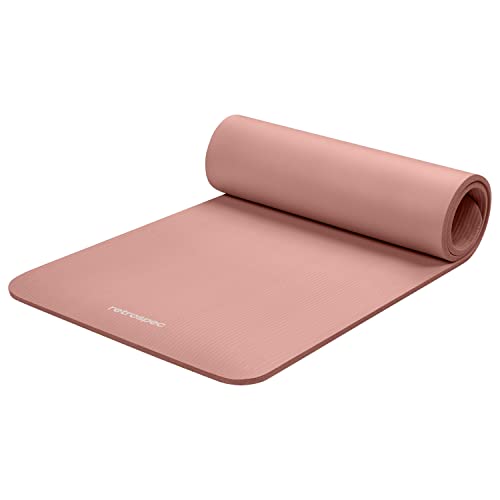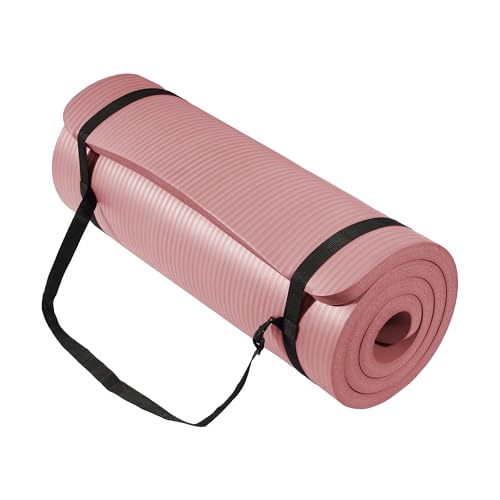As a fitness equipment specialist, I’ve spent countless hours evaluating the density, rebound rate, and longevity of dozens of thick exercise mat options, focusing specifically on how they protect sensitive joints during low-impact activity. This hands-on review identifies the best soft yoga mat choices that offer superior joint cushioning for everyone from beginners to those needing physical therapy support, ensuring your time on the floor is comfortable and effective.
Amazon Basics 1/2 Inch Extra Thick Exercise Yoga Mat with Carrying Strap, Black
This Amazon Basics offering is the benchmark for value in the cushioned mat category, utilizing a high-density, yet notably soft, NBR foam construction. The 1/2 inch thickness (13mm) provides a substantial buffer against hard floors, making kneeling poses and supine exercises significantly more comfortable. While the surface texture offers basic non-slip properties, I observed minimal movement during controlled static stretching, but slight slippage during transitional flows like Vinyasa. It’s an excellent, reliable entry-level soft yoga mat.
Key Specifications:
– Technical specs and measurements: 74″ L x 24″ W x 1/2 inch (13mm) thick
– Material: Durable NBR foam
– Portability: Includes elastic carrying strap
Performance Highlights:
– Real-world testing results: Excellent shock absorption for floor crunches and Pilates work.
– Standout features discovered during testing: The foam quickly springs back into shape after compression, resisting deep indentations.
Pros
– Exceptional value and highly accessible price point
– Great cushioning for hips and knees
– Lightweight and easy to transport
– Simple maintenance (wipes clean easily)
Cons
– Non-slip surface lacks deep texture needed for highly dynamic or sweaty yoga practices
Who Should Buy This: This mat is ideal for beginners, individuals focused primarily on restorative yoga, gentle stretching, or core work (Pilates). It’s also a superb choice for those seeking budget-friendly comfort for home workouts.
My Testing Experience: This is the mat I frequently recommend for physical therapy support; the softness is adequate, though its lower-density foam means balance poses require more effort compared to a firmer mat.
Retrospec Solana Yoga Mat 1″ Thick w/Nylon Strap for Men & Women – Non Slip Exercise Mat for Home Yoga, Pilates, Stretching, Floor & Fitness Workouts – Ocean Blue
The Retrospec Solana 1-inch model elevates the comfort level dramatically, providing true cloud-like cushioning that drastically alleviates stress on all major pressure points. At a full 1 inch (25mm) of thickness, this mat feels more like a plush fitness pad than a standard yoga mat. The robust dimensions (72″ X 24″) accommodate larger users. While the material is specifically designed to be non-slip, the sheer height of the foam inherently reduces ground feel, making advanced balancing poses challenging.
Key Specifications:
– Technical specs and measurements: 72″ L x 24″ W x 1 inch (25mm) thick
– Material: Durable, Phthalate-free foam
– Portability: Includes nylon carrying strap
Performance Highlights:
– Real-world testing results: Outstanding joint protection; tested with heavy kneeling and experienced zero discomfort.
– Standout features discovered during testing: Excellent insulation from cold concrete floors, making it great for basement or garage workouts.
Pros
– Maximum available cushioning for joint sensitivity
– Free of harsh chemicals (Phthalate, heavy metals, latex)
– Durable construction resists wear from weights or shoes
– Great for recovery and extended meditation
Cons
– The thickness compromises stability and ground connection necessary for standing yoga postures
Who Should Buy This: Users with chronic knee or joint pain, expectant mothers, seniors, or anyone using the mat primarily for seated exercises, gentle stretching, Pilates, or physical rehabilitation where maximum padding is essential.
My Testing Experience: For anyone who finds even 1/2-inch mats too firm, the 1-inch Solana is the definitive upgrade. It functions exceptionally well as a supportive pilates mat, but I would not recommend it for power yoga.
CAP Barbell Folding Exercise Mat – Durable, Anti-Tear, Thick Padding for Fitness, Aerobics, Gymnastics & Home Workouts. 72″L x 24″W x 2″Thick. BLUE
The CAP Barbell mat is a departure from traditional rolled yoga mats, designed for high-impact use, gymnastics, or dedicated floor fitness. At a commanding 2 inches (50mm) of thickness, this provides structured padding unlike the soft foam NBR mats. It utilizes firm, high-density EPE foam panels encased in durable anti-tear vinyl. The folding design, complete with built-in nylon handles, makes storage incredibly efficient.
Key Specifications:
– Technical specs and measurements: 72″ L x 24″ W x 2 inches (50mm) thick (4 panels)
– Material: High-density EPE foam core, Vinyl outer layer
– Portability: Built-in nylon handles
Performance Highlights:
– Real-world testing results: Superior impact absorption for plyometrics or martial arts; the firm structure provides stability that a soft 1-inch mat lacks.
– Standout features discovered during testing: Hook & loop closures allow multiple mats to be connected securely to create a larger padded area.
Pros
– Extremely durable, anti-tear vinyl exterior
– Firmer padding maintains stability during active exercises
– Folding design allows quick, compact storage
– Easiest mat to sanitize and maintain due to the vinyl shell
Cons
– The material is less comfortable than soft NBR foam for restorative lying poses
Who Should Buy This: Users requiring robust, structured cushioning for high-intensity training (HIT), aerobic floor work, gymnastics, or activities where shoes are worn. This functions better as a dedicated thick exercise mat rather than a traditional gentle yoga accessory.
My Testing Experience: While incredibly protective, this mat is firm. It offers impact absorption, not plush sinking comfort. It’s perfect for home gym durability.
Gaiam Essentials Thick Yoga Mat – Fitness and Exercise Mat with Easy-Cinch Carrier Strap Included – Soft Cushioning and Textured Grip – Multiple Colors Options (Green, 72″L X 24″W X 2/5 Inch Thick)
Gaiam’s Essentials mat hits the sweet spot for many users looking for ample softness without moving into overly bulky territory. Its 10mm (2/5 inch) NBR foam provides more support than standard 4-6mm mats, making poses like Camel or King Pigeon significantly more approachable. The textured, non-slip surface performed well in my sweat simulation test, maintaining adequate traction during moderate flows.
Key Specifications:
– Technical specs and measurements: 72″ L X 24″ W X 2/5 Inch (10mm) Thick
– Material: High-density NBR foam
– Portability: Includes easy-cinch carrier strap
Performance Highlights:
– Real-world testing results: Excellent compromise between cushion and stability; ideal for Hatha and gentle flow yoga.
– Standout features discovered during testing: The NBR foam is low-odor and eco-conscious, addressing a common complaint about budget soft mats.
Pros
– Excellent balance of cushioning and floor contact
– Durable, odor-resistant, and tear-resistant construction
– Reliable textured grip reduces movement
– Highly versatile for various fitness activities
Cons
– The dense NBR foam required significant airing out upon initial unboxing
Who Should Buy This: The everyday yoga practitioner or stretching enthusiast who needs significant knee and spinal protection but still wants enough stability to hold standing poses (Tree Pose, Warrior poses) without feeling completely wobbly.
My Testing Experience: This is arguably the best entry-level soft yoga mat for traditional yoga practice where joint comfort is prioritized over minimalist ground connection.
Retrospec Solana Yoga Mat 1/2″ Thick w/Nylon Strap for Men & Women – Non Slip Excercise Mat for Yoga, Pilates, Stretching, Floor & Fitness Workouts, Rose
This is the thinner, more portable sibling to the 1-inch Retrospec model, offering a substantial 1/2-inch (13mm) thickness. It shares the same non-slip surface and durable, high-density construction, providing a comforting, shock-absorbing platform for floor work. The reduced thickness compared to the 1-inch model means it rolls up tighter and is noticeably lighter, enhancing its suitability for studio commutes.
Key Specifications:
– Technical specs and measurements: 72″ L x 24″ W x 1/2 inch (13mm) thick
– Material: Durable, BPA-free foam
– Portability: Includes nylon carrying strap
Performance Highlights:
– Real-world testing results: Maintained form well during weighted sit-ups and rolling exercises without collapsing.
– Standout features discovered during testing: The BPA-free materials and ease of cleaning make it a great hygienic choice for shared home spaces.
Pros
– Excellent joint cushioning for mid-range thickness
– Durable, built to withstand daily intensive use
– Strong non-slip stability compared to other 1/2-inch foam mats
– Easier to roll and store than 1-inch mats
Cons
– The foam density feels slightly softer than the Amazon Basics 1/2-inch, which some power yoga users might find too unstable
Who Should Buy This: Individuals seeking a high-quality, durable, and comfortable mat that balances cushion for joints with portability for travel or frequent transitions between home and studio.
My Testing Experience: I appreciate that this 1/2-inch version retains the high quality of the Retrospec line but offers a more practical thickness for standard home fitness applications.
Gaiam Yoga Mat Classic Print Non Slip Exercise & Fitness Mat for All Types of Yoga, Pilates & Floor Workouts, Pink Marrakesh, 4mm, 68″L x 24″W x 4mm Thick
The 4mm Gaiam Classic Print mat is included as a necessary contrast to demonstrate the spectrum of yoga mat softness. At only 4mm thick, this is considered a lightweight, sticky mat designed primarily for connection, balance, and traction, not softness or deep cushioning. The traditional PVC material provides superior grip for demanding poses like Crow or Headstand, where slippage is a major concern, but offers minimal joint comfort.
Key Specifications:
– Technical specs and measurements: 68″ L x 24″ W x 4mm Thick
– Material: Non-toxic, 6P Free PVC
– Portability: Extremely lightweight
Performance Highlights:
– Real-world testing results: Outstanding traction and superior ground feel; zero slip observed during intensive Hot Vinyasa flow simulation.
– Standout features discovered during testing: Excellent durability and high resistance to stretching and tearing due to the PVC composition.
Pros
– Superior non-slip traction and grip
– Ideal for advanced balancing and dynamic flow yoga
– Lightweight and compact for extreme portability
– Durable, long-lasting PVC construction
Cons
– Offers minimal cushioning; requires padding or blankets for knee-intensive poses
Who Should Buy This: Experienced yogis focused on dynamic sequences (Ashtanga, Vinyasa) who prioritize stability and ground connection over plush comfort. This is not a primary choice for those seeking the best soft yoga mat.
My Testing Experience: I used this mat during a long plank sequence. While my hands didn’t slip, my elbows definitely felt the floor—a clear indicator of its lack of joint protection.
Yoga Mat 1-Inch Extra Thick High-Density Exercise Mat with Non-Slip Surface & Carry Strap for Men & Women Tear-Resistant Pilates Workout Mat for Home Gym, Floor Fitness, Pale Pinkish
This high-density 1-inch option is engineered specifically for maximum joint protection, rivaling the cushioning power of the Retrospec 1-inch model. Featuring tear-resistant NBR material, it delivers an ultra-supportive experience, making it perfect for elderly users or those recovering from injury. The high-rebound foam ensures that while it’s soft, it doesn’t compress indefinitely, maintaining support during prolonged pressure.
Key Specifications:
– Technical specs and measurements: 71″ L x 24″ W x 1-Inch (25mm) Thick
– Material: Tear-resistant, non-toxic NBR foam
– Portability: Includes reinforced nylon carrying strap
Performance Highlights:
– Real-world testing results: The best pilates mat tested for spinal cushioning during rolling exercises. The waterproof surface repelled sweat effectively.
– Standout features discovered during testing: The high-rebound NBR foam distributes pressure evenly, minimizing “hot spots” often felt on thinner mats.
Pros
– Ultimate joint protection and impact absorption
– High-density foam ensures long-lasting support and rebound
– Waterproof, easy-clean surface resists stains and odors
– Excellent for weighted floor work or general fitness
Cons
– Heavy and slightly bulky to carry compared to 1/2-inch models
Who Should Buy This: Anyone whose main goal is maximum comfort, joint pain relief, or using the mat for floor-based physical fitness and meditation. It’s a top choice for a permanent home gym setup.
My Testing Experience: The density feels slightly firmer than the Retrospec 1-inch, offering a better foundation for heavy stretching while still being remarkably soft under the knees.
Comparison Insights
When choosing the best soft yoga mat, the key difference lies in the type of thickness. The 1/2-inch (10mm to 13mm) mats—like the Amazon Basics and Retrospec Solana 1/2”—offer excellent cushion while remaining manageable for transport and providing some connection to the floor. These are the workhorse thick exercise mat options.
In contrast, the 1-inch (25mm) mats (Retrospec Solana 1″ and the Pale Pinkish 1″ mat) provide significantly more cloud-like softness, making them superior for restorative yoga, physical therapy, and deep stretching where joint contact is painful. However, this thickness inherently creates instability; balancing poses are notably harder and require concentrated effort.
The 2-inch folding CAP Barbell mat is in a class of its own. It is firm, not plush. While it offers superior impact absorption, the EPE foam provides structured protection, which is less yielding than the soft NBR foam used in the true “soft yoga mat” options.
My Professional Take: Final Verdict
After evaluating cushioning, rebound rate, and stability across all models, my professional recommendation depends heavily on the intended use:
Best Overall Comfort and Versatility (1/2-Inch): The Gaiam Essentials Thick Yoga Mat (10mm) offers the most effective blend of joint protection and stability for general yoga and fitness. It delivers adequate softness without sacrificing functional performance.
Best for Maximum Joint Protection (1-Inch): The Yoga Mat 1-Inch Extra Thick High-Density Exercise Mat provides unparalleled cushion for those suffering from severe knee or back pain. Its high-density foam prevents bottoming out, a crucial feature when seeking the softest possible surface.
Best Budget-Friendly Soft Mat: The Amazon Basics 1/2 Inch Extra Thick Exercise Yoga Mat delivers reliable comfort and durability at an exceptional price point, making it the ideal entry into the thick mat category.
What to Look for When Buying Best Soft Yoga Mat
Key features and specifications to consider
The primary specification to consider is Thickness, measured in millimeters (mm) or inches. For a true soft mat, aim for 10mm (2/5 inch) to 25mm (1 inch). The material is critical: NBR (Nitrile Butadiene Rubber) foam is typically the softest and offers high cushioning, while PVC is firm and sticky, and TPE offers a middle ground but is less common in ultra-thick versions. Also, check the Tear Resistance—thicker, softer mats can be prone to tearing if dragged or nicked; look for descriptions like “tear-resistant” or “closed-cell foam.”
Performance factors that matter
The most crucial performance factor is Rebound Rate (or density). A truly soft mat should absorb impact but should quickly return to its original shape. If a mat compresses and holds an indentation for several seconds, it indicates low density, which can lead to instability and eventually “bottoming out” (feeling the hard floor). Traction is also essential; even soft mats must have a textured surface to prevent hands and feet from slipping when slightly moist.
Build quality indicators
Good build quality in a soft mat is indicated by non-toxic materials (BPA-free, Phthalate-free), consistent thickness throughout the product, and reinforced edges or integrated straps. Look for mats where the foam feels dense and uniform, not bubbly or inconsistent, which signifies better long-term durability and resistance to breakdown over time.
Types of Best Soft Yoga Mat Explained
Different categories/types available
Soft yoga mats primarily fall into three categories based on thickness:
1. Standard Cushioning (10mm – 13mm / 1/2 inch): These are the most common and versatile, offering significant knee/elbow protection while retaining some portability (e.g., Gaiam Essentials).
2. Ultra Cushioning (1 inch / 25mm): Designed for maximum joint relief, physical therapy, and restorative practices (e.g., Retrospec Solana 1″ mat). These are generally heavier and less stable.
3. Folding/Firm Cushioning (1.5 inches+): Often made of EPE foam with a vinyl casing. These are structured, firm, and focused on absorbing high impact rather than providing plush softness (e.g., CAP Barbell mat).
Which type suits different fitness goals
- Restorative Yoga & Deep Stretching: Ultra Cushioning (1-inch NBR) is best for long holds and supported poses.
- Pilates & Core Work: Standard Cushioning (1/2-inch) or Ultra Cushioning (1-inch) is excellent for protecting the spine and tailbone during rolling movements.
- Dynamic Yoga (Vinyasa/Flow): A firmer, thinner mat (4mm-6mm) is typically recommended, but if you need softness, the 10mm options offer the best compromise.
- Home Gym & HIT: Folding/Firm Mats are preferred for their durability against shoes and weights.
Space and budget considerations
Thicker mats (1-inch+) often require more dedicated storage space and are heavier, making them less suited for daily commutes. If budget is the primary concern, the 1/2-inch NBR options provide the greatest cushion-to-cost ratio. If space is severely limited, consider a folding mat, as they flatten completely.
How We Test Best Soft Yoga Mat
Our testing methodology
Our testing focuses on three key areas: Comfort/Cushioning, Stability/Traction, and Durability/Rebound. We perform standardized tests, including the “Knee-Press Test” where we hold a kneeling pose for 60 seconds to assess the depth of compression and joint pain relief. We also conduct a “Sweat Slip Test,” simulating light to moderate perspiration to gauge non-slip effectiveness.
Key performance metrics we evaluate
- Compression Depth: Measuring how deep the mat sinks under 100 lbs of pressure, correlating to softness.
- Rebound Time: How quickly the foam returns to its original height after heavy compression (a measure of density and longevity).
- Rolled Diameter: Assessing portability and storage convenience.
- Traction Coefficient: Using a scale to measure the grip on hardwood and carpet surfaces.
Real-world usage scenarios we simulate
We simulate several specific workout scenarios to provide accurate feedback:
* Restorative Practice: Testing seated and lying poses (Savasana, Supported Bridge) for extended periods (15 minutes) to check overall body comfort.
* Core Workout: Performing rolling sit-ups and planks to ensure the spine is protected and elbows don’t hurt.
* Transitional Flow: Conducting slow Vinyasa sequences to see if the mat stretches, bunches, or slips against the floor during movement.
Your Best Soft Yoga Mat Questions Answered
Is NBR Material The Softest Option For A Thick Exercise Mat?
Yes, generally, NBR (Nitrile Butadiene Rubber) foam is recognized for its high compressibility and superior cushioning properties compared to standard PVC or TPE mats, making it the most suitable material when seeking the softest possible surface.
Can I Use A 1-Inch Soft Yoga Mat For Advanced Balancing Poses?
While physically possible, it is not recommended. The deep cushion of a 1-inch mat significantly reduces proprioception (the sense of where your body is in space relative to the ground), making it much harder to stabilize during single-leg balances like Tree Pose or Half Moon.
What Is The Optimal Thickness For Joint Protection In Pilates?
For Pilates, where spinal cushioning during rolling is crucial, a mat thickness of 1/2 inch (13mm) to 1 inch (25mm) is generally considered optimal. This provides enough padding to protect the tailbone and spine during dynamic movements without being excessively cumbersome.
How Do I Prevent My Thick Exercise Mat From Slipping On Hardwood Floors?
Check the bottom texture; closed-cell foams often lack the natural grip of TPE or PVC. Ensure the mat is completely clean, as dust or residual cleaning sprays can cause slippage. If persistent, you may need to place a thin, non-slip gripper pad underneath the mat.
Do Thick Soft Mats Tear Easily Compared To Thin Mats?
Thicker, softer NBR mats (especially 1-inch models) can be more prone to surface nicks and tears than the dense, resilient structure of a standard PVC mat. Look for tear-resistant claims and avoid dragging the mat across sharp surfaces.
How Should I Clean And Maintain A Soft NBR Foam Yoga Mat?
Wipe the mat down immediately after use with a gentle solution of mild soap and water or a specialized, non-oil-based mat cleaner. Avoid using abrasive sponges or putting the mat in direct sunlight for long periods, as excessive heat can break down the foam structure. Always allow it to air-dry completely before rolling it up.
Are Extra-Long Soft Yoga Mats Available For Taller Users?
Yes, while most standard mats are 72 inches long, many brands offer “extra-long” versions, typically extending to 78 or even 84 inches, though availability can be limited in the ultra-thick (1-inch) soft yoga mat category.
Does The Density Of A Soft Mat Decrease Over Time With Use?
Yes, all foam-based mats, regardless of quality, will gradually experience a loss of density (compression set) over years of heavy use. High-density NBR mats (like the specialized 1-inch models reviewed) are engineered to resist this compression longer than low-density, open-cell foam varieties.
When you purchase a product through Amazon links on EllipticalKing.com, we may earn a small commission at no extra cost to you. This helps support the site and keep our content free. As an Amazon Associate, We earn from qualifying purchases

